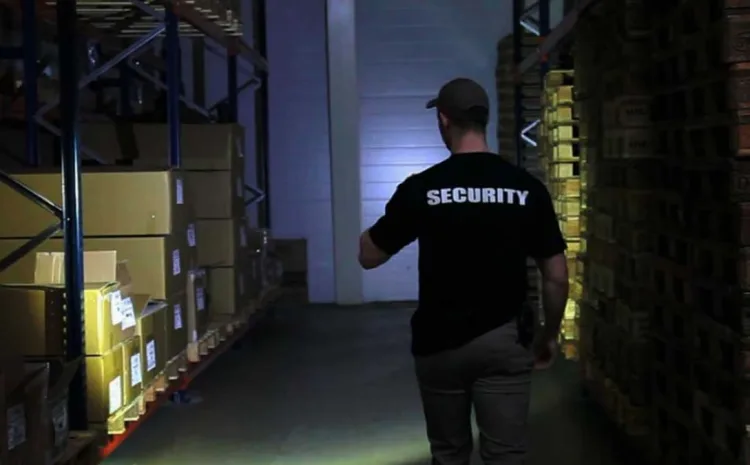
Warehouse Security Guard In Los Angeles
In today’s global economy, warehouses have become essential in business operations. These facilities store and move goods, manage inventory, and fulfill orders. As such, warehouse security is critical in ensuring the safekeeping of invaluable assets, meeting legal compliance, and avoiding production downtimes. The role of a warehouse security guard is to ensure the safety and security of these facilities, deter criminal activities, and act with discretion when security breaches occur. They patrol the warehouse premises, monitor surveillance systems, and respond to incidents and security threats.
Importance of warehouse security
Los Angeles, one of the busiest ports and transportation hubs in the world, handles billions of cargo annually. This prominence attracts plenty of attention from organized crime such as cargo theft, counterfeiting, cyber-attacks, and employee theft – all threats that a well-trained unarmed or armed security guard should identify and combat. In addition to preventing external criminal activities, warehouses are also prone to physical accidents that could cause great harm to employees and threaten the warehouse’s operations. A robust security system in place can provide a safe environment and mitigate any security threat.
Access Control
Access control is vital to warehouse security. A security guard is typically the first point of contact for visitors and delivery personnel, and as such, they must be vigilant in allowing only authorized person access to the warehouse. They are responsible for verifying identifications, checking for proper clearance, and denying entry for unauthorized personnel.
Monitoring Surveillance Systems
Surveillance systems such as closed-circuit cameras, alarm systems, and access control systems can provide real-time visibility into potential security breaches. A warehouse security officer should have the ability to monitor and interpret the surveillance systems, recognize suspicious activities, and respond appropriately.
Regular Perimeter Checks
A security guard’s critical duty is to perform regular perimeter checks to ensure that no unauthorized personnel has accessed the facility from outside. This involves monitoring any suspicious activities, including people walking or loitering outside and other related unusual occurrences.
Interior Patrols to Deter and Detect Suspicious Activities
The security guard must conduct frequent patrols inside the warehouse to deter and detect suspicious activities. They should be alert to any irregularities, such as damage to products, theft, or any sign of tampering. The security guard must work closely with warehouse employees to detect such activities quickly.
Handling Emergencies and Incidents
Warehouse security personnel should be trained to handle emergencies such as medical emergencies, fires, and accidents. They must remain calm and follow established procedures that ultimately prevent loss of life, injury, or property damage.
Documenting and Reporting Security-Related Incidents
Documenting and reporting security-related incidents is an essential aspect of a security guard’s duty. They must maintain an accurate record of every security breach and report any significant incident to the management team. Timely reporting of incidents can significantly enhance the security and safety of the warehouse.
Essential Skills and Qualifications
Physical Fitness and Stamina: Warehouse security officers must be physically fit to fulfill their duties. They need to stand, walk or patrol for prolonged periods, react quickly to emergencies, and perform their tasks with energy and speed.
Effective Communication Skills: Warehouse security personnel must communicate effectively with warehouse staff, law enforcement agencies, and visitors. They should be able to communicate clearly and confidently, professionally present themselves, and maintain an approachable demeanor when dealing with people.
Knowledge of Security Protocols and Procedures: Guards for warehouse security must have comprehensive knowledge of security protocols and procedures, including emergency management and response plans. They must be familiar with the standard operating procedures of the warehouse and possess a high degree of attention to detail.
Ability to Handle Emergency Situations: A warehouse security officer should have problem-solving skills and the ability to handle emergencies with tact and poise. They should be able to assess the situation quickly and take appropriate steps to mitigate the damage.
Training and Certifications Required: Personnel for Warehouse security must undergo training on security protocols, procedures, and threat mitigation. They should be able to obtain certification in relevant areas that demonstrate their competence and proficiency in the security duties required.
Adopting Proactive Measures for Protection
In addition to monitoring and responding to potential security threats, it is vital that warehouse security officers take proactive measures to protect their premises. This includes implementing access control measures, such as personnel badges or keycards, and installing a comprehensive surveillance system. These measures can help mitigate potential threats before they happen, resulting in a secure environment for warehouse personnel and visitors. Furthermore, security guards should be trained to identify suspicious individuals and take necessary steps to ensure their safety.
Warehouse security guards provide a valuable service to businesses, ensuring the safety and integrity of their products and visitors. By understanding the local environment, staying alert, employing proactive security measures, and following standard operating procedures, they can protect their premises from any potential threat.
